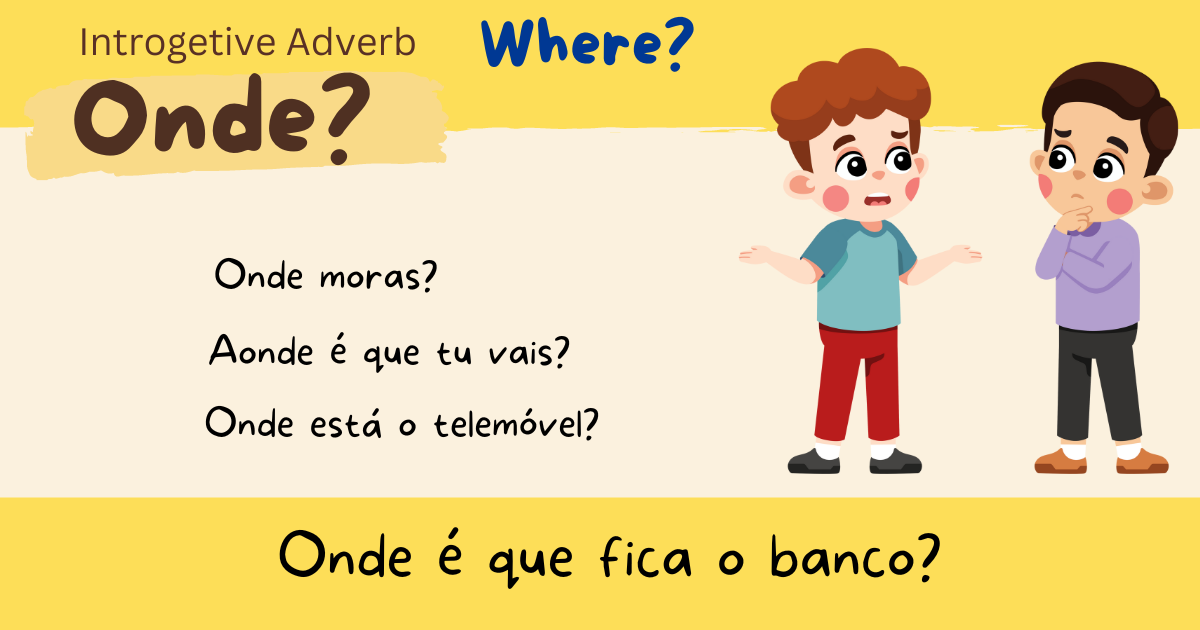
Gain a deeper understanding of Portuguese by mastering the use of the introductory adverb onde. These powerful language tools can help you express yourself more confidently and effectively. Don't miss out on the opportunity to elevate your language skills and impress your friends and colleagues. Start exploring the world of introductory adverbs in Portuguese today!
Objective:
By the end of this article, you will be able to understand and use the interrogative adverb onde correctly in different contexts.
Introduction:
Adverbs are an essential language component, and in Portuguese, they play a crucial role in providing additional information about actions, circumstances, and other adverbs. Today's discussion will focus on the constructive use of "interrogative adverbs." These adverbs help us construct meaningful questions about location, time, method, and reason. By mastering the use of these adverbs, we can become better communicators and enrich our ability to describe and understand the world around us.
Common Interrogative adverbs:
- Onde? (Where?)
- Quando? (When?)
- Como? (Why?)
- Porque? (Why?)
Onde? (where?)
Definition:
Onde is used to ask about the location or place of something.
Usage:
Use "onde" when asking about places or locations.
Examples:
1.
Question: Onde moras? Where do you live?
Answer: Eu moro em Lisboa. I live in Lisbon.
2.
Question: Onde fica a biblioteca? Where is the library?
Answer: A biblioteca fica na rua principal, ao lado do parque.The library is on the main street, next to the park.
3.
Question: Onde fica a estação de metrô mais próxima? Where is the nearest metro station?
Answer: A estação de metrô mais próxima fica a duas quadras daqui. The nearest metro station is two blocks from here.
4.
Question: Onde é a casa de banho? Where is the bathroom?
Answer: A casa de banho fica ao lado da cozinha. The bathroom is next to the kitchen.
5.
Question: Onde é que comprou este livro? Where did you buy this book?
Answer: Comprei este livro na livraria do centro comercial. I bought this book at the bookstore in the mall.
6.
Question: Onde podemos encontrar um bom restaurante? Where can we find a good restaurant?
Answer: Vocês podem encontrar um bom restaurante no centro da cidade. You can find a good restaurant in the city center.
Notes:
- 1. Position in the sentence
The word "onde" can either come before or after the verb, depending on how you want to emphasize the sentence.
For instance, consider the following two sentences:
- a. Onde tu compras isto livro?
Here, "Onde" comes at the beginning of the sentence, which emphasizes the location of the bookstore where this book was bought.
- b. Tu compras isto livro onde?
- Here, the meaning is the same, but the question emphasizes the book more than the store where this book was bought."
- 2. Aonde
Aonde is a contraction between the adverb Onde and the preposition a. It is frequently used with the verb ir.
a. Aonde é que tu vais?
Where are you going?
Eu vou para casa.
You can use some alternatives that are very common in Portugal.
b. Onde é que tu vais?
Or
c. Para onde é que vai?
It depends on the context.
- 3. Asking about the location of Onde + estar verb + subject.
Use this structure usually when you ask about the location of anything.
Examples:
a. Onde está o telemóvel?
Where is the mobile phone?
b. Onde está o banco?
Where is the bank?
- 4. Onde + (é que) + verb (conjugative form)
Use this structure when the action is more important than the object.
a. Onde é que comprou este livro?
Where did you buy this book?
b. Onde é que aprendeu a cozinhar?
Where did you learn to cook?
Conclusion:
In Portuguese, the use of "onde" combined with prepositions like "em" or "de" or with the verb like estar or other action verbs, serves as a fundamental tool for inquiring about location, direction, or origin. Whether positioned after the verb or occasionally preceding it for emphasis, the structure and application of "onde" with prepositions are crucial for effective communication. By mastering this tool, learners can confidently ask specific questions about the whereabouts of objects or individuals, enhancing their proficiency in Portuguese communication and fostering clearer exchanges in various contexts.
Good luck!

